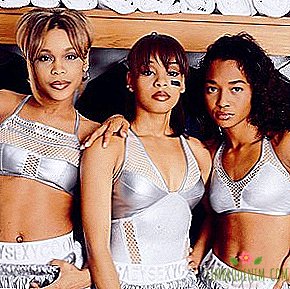Someone else among us: How I understood that I was bisexual
We all know about gay, lesbian, transgender discrimination- in the conversation about the oppression of the LGBT community, it is first of all at the hearing of his L, G and T parts. But bisexuals are no exception - moreover, they often simultaneously face homophobia and indulgence within the queer community. There is even a special term for this — biphobia. The myth still lives that bisexuality is just an “intermediate stage” for a person who is trying to realize his or her own orientation. Our heroine faced biphobia personally and told us about what happens when defining oneself.

Awareness of sexuality
Even in kindergarten, I showed a cautious research interest in both boys and girls. I played a family with a boy, and another time I could offer to arrange a wedding for my girlfriend - it was all fun and natural. A few years later, already in elementary school, I learned that girls kissing girls are called the “scary” word “lesbians”. This alarmed me greatly: for if I were a lesbian, I could not become a princess; Princess finds / wakes / rescues the prince, and other girls in this scenario by no means fit. I remember crying and making a promise to put an end to the "violent years of unbridled lesbianism." This is my first memory of abandoning my "lesbian half."
I always felt that my personality was split into two parts: me hetero and me lesbian. Relations with boys are visible and normative, they are associated with many cultural codes and scenarios: relatives are interested in my “fiancés”, we discuss boys at school, I see romance and relationships in films, books and even advertising. My feelings for girls are a shame and a nightmare, because I have nothing to relate to even the most elementary manifestations of my attraction.
Relations with girls were poisoned by external and internal homophobia, the threat of harassment, and a particularly acute fear of being rejected.
Relations with girls were poisoned by external and internal homophobia, the threat of harassment and a particularly acute fear of being rejected. For example, once we were traveling with a classmate on the subway, and in front of us were two butch lesbians. She turned to me and said: "I’m going to throw up now. People like them should be treated." Before that, I thought for a long time that I must finally gather my will into a fist and tell her how I like her. The fact that one day I will have at least some good relationship with girls, since then I have not counted.
Before my eyes there were practically no healthy models of relations with women. When I showed concern and interest, I automatically slipped into toxic "male" patterns of behavior and began to treat my interlocutor patronizingly. All this was generously seasoned with an internal mis-line and settings like "no female friendship," "boys are much smarter," "only pink rags are interesting to girls." In general, heterosexual and lesbo-I lived two completely different lives, and I grew secretive and nervous.
I was able to formulate my feelings in the phrase “I am bisexual” at about fourteen years old. It took me another ten years to come to a simple, but stunning thought: I have no homosexual and heterosexual "halves", there is only bisexuality. It was a breakthrough. After I stopped focusing on non-existent binarity, my life improved greatly: I stopped devaluing my experience with men and experiencing stress and horror from “lesbian self”.
"Did you have sex with a girl?"
The most common definition of bisexuality, formulated by the activist Robin Oks, now sounds like this: this is the possibility of a romantic and / or sexual attraction to people of more than one sex and / or gender; this attraction is not necessarily the same, not necessarily at the same time, not necessarily with the same intensity. The concept of bisexuality evolved along with our ideas about gender: now it includes attraction to non-binary people, that is, those whose gender identity does not correspond to either male or female.
In this form, it partially overlaps with the concepts of pansexuality (sexual or romantic attraction to people regardless of biological sex and gender identity), polysexuality (attraction to several genders, but not necessarily to all) or omsexuality (sexual or romantic attraction to people of all genders ). A person who identifies himself as a bisexual is not at all necessarily a transfer phobia and drowns for rigid binary, but the choice of the most comfortable label for himself remains for everyone. I still prefer bi, because the very existence of the word "bisexual" at one time brought me great relief, and I don’t want to change it to a "pansexual" for sentimental reasons.
I came out at my mother at sixteen. She replied: "The main thing is that you are happy." Then she added: “Although I think that at this age you cannot understand your sexuality. Most likely, this will pass.” Mom did not reject me and was not strict, just mildly expressed disbelief. I felt that they were taking care of me, and since my mother says that it will pass, she is probably right - for the sake of my own good, I better not trust my feelings. It became the core of my internal biphobia.
My interlocutors clearly considered themselves to be 100% heterosexual before sex with the opposite sex; for some reason I didn’t have the right to trust myself until I baked my bisexuality
All LGBTQI + people are afraid of rejection, isolation and violence. At the same time, each category and each personality has a relationship with its identity in its own way. In my experience, the most common reaction to bisexuality is doubt. Bisexual people are constantly faced with the need to prove something and make excuses. When I mentioned my orientation — neat and half-joking as a teenager or straight and confident in a conversation with an adult advanced friend — I almost always got back: “How do you know? Did you have sex with a girl?”
I faced this question at different stages. When I had no sexual experience, I fell into a stupor from him. And really, how can I know that this is mine, if I did not have a lesbian relationship? Although I still caught a contradiction in this logic: my interlocutors clearly considered themselves to be 100% heterosexual before sex with the opposite sex; for some reason I did not have the right to trust myself until I "bash" my bisexuality. When I had sex only with men, after this question I felt ashamed: really, where would I go if practice shows that I only meet boys? You still need to trust yourself less and listen to more outside experts. Finally, when I already had sex with both men and women, I was happy that I could successfully pass the "exam" for bisexuality.
Bisexuality in many people causes discomfort and the desire to enter a person into one of the categories for some indirect reasons. It's funny that different stereotypes work for women and men: it is believed that both of them actually attract only men. A bisexual is perceived as a heterosexual woman, and her same-sex relationships are not serious experiments and show-off in order to seem interesting to men. Over time, she will calm down and settle down in a strong marriage, with her husband and children. Bisexual men, of course, are actually gay, just do not know about it themselves. Well, not the same.
Bisexuals themselves are often uncomfortable to openly call themselves bi because of the huge number of negative stereotypes associated with this word. The founder of the project "children-404" Lena Klimova every year on September 23, the bi biology visibility day, quotes Alexandra Skochilenko's excellent text about biphobia: "It's easier to tell people that you're a lesbian than to call yourself bisexual, because this word sounds unpleasant, gives away some MTV. "

"I normal?"
From adolescence I wanted to work in a human rights LGBT organization. At twenty-one, I thought that I was finally ready to participate in some volunteer activity, but immediately began postponing it. I was afraid that I would feel inappropriate, they would let me know that I was not welcome, and in general, my bisexuality would never be enough to be accepted anywhere. The slogan “bi - in *** and” is never funny for us in LGBT public places or in gay clubs, where bisexuals also come for support and safety. Literally forcing myself to come to the side-by-side LGBT film festival team, at first I didn’t correct people who took me for a lesbian.
Then I volunteered for the LGBT hotline. It was a very powerful experience that changed a lot for me. Together with other volunteers, we passed trainings on rendering psychological assistance, learned to give basic legal advice and understood how correct our knowledge about LGBT people was; in parallel, we worked with motivation, burnout, and simply discussed everything that was incomprehensible to us about the LGBT community.
The experience of belonging to something gave me the feeling that I was finally able to relax my painfully tense muscles.
As I felt comfortable with my colleagues, I began to realize how much all this time I was uncomfortable with myself. I lived in the utmost tension, like a man constantly ready for a fight. The experience of belonging to something gave me the feeling that I was finally able to relax my painfully tense muscles. Suddenly, I managed to name the feelings that had previously crushed me like a big sticky lump: shame, secrecy, constant readiness for defense, a feeling that something was wrong with me, that I did not deserve love.
Interaction with subscribers was probably the strongest experience. Someone needed urgent help in monstrous situations (see what the LGBT network is doing now in connection with the situation with the persecution of gays in Chechnya), and then I redirected them to our lawyers and experienced psychologists. But almost all of those who called simply to consult or share, eventually asked the same question: "Am I normal?"
Feeling that you are a freak and you fall out of the box, most LGBT people pursue. Since people around us often perceive bi as heterosexuals or homosexuals, depending on the gender of their current partner, it is very easy to feel invisible. Let's say some people know that I worked for a LGBT organization, but also heard something about my ex-boyfriend. Many times I watched as it introduced them into a stupor. Did I do this because I was just "sympathetic," or did I have a boyfriend to cover? Before, because of their reactions, I was painfully ashamed of myself. Now I understand that if people think only in terms of “homo / hetero” and do not consider bisexuality as the same orientation, it should not be a shame to me that I am a freak. This they do not understand.
Double discrimination
Bisexuality does not need justifications and proofs, but our culture has a common idea that anyone has the right to break into foreign borders, to doubt on every occasion and demand information that can be obtained from Google’s first link. For example, complete strangers fall asleep to trans * people with questions about their genitals and are offended if nobody appreciates their generous interest. But in a situation with bisexuals, as well as with other members of the LGBT community, blindness to foreign borders has a very frightening aspect. According to statistics, for bisexual women, the chances of facing sexual abuse are almost twice as high as those of heterosexuals. In the US, 46% of bisexual women, 17% of heterosexual women and 13% of lesbians were raped. Among men, 47% of bisexuals, 40% of gays and 21% of heterosexuals became victims of sexual violence.
Lechery, omnivorous, and willingness to have sex with everyone - one of the worst myths about bisexuals that poison our lives. Of course, bisexuals are different, as are people in general. Someone enjoys polyamoria and sexual freedom; someone lives in the framework of serial monogamy, then with a man, then with a woman, then with a non-binary person; someone has sexual experience with only one of the genders; Someone is asexual or has only a romantic attraction for one of the genders. But in mass culture we are still portrayed as vicious, dangerous, insatiable, two-faced, or, at worst, completely entangled in themselves. In addition to indicators of sexual abuse, bisexuals are leading in the statistics of suicides, depression and inclination to various addictions. At least in the US, data for Russia is not available.
In a speech at the Human Rights Campaign "Visibility Award" actress and openly bisexual Evan Rachel Wood said she saw the reason for bisexual vulnerability in self-assessment: "I was ashamed of my feelings and my identity. Out of the way and, unfortunately, inside the community" . The problem of double discrimination is really there. We share with the gays and lesbians all the "charms" of life in a homophobic environment. We may be subjected to outing, being fired or evicted due to orientation, beaten near the gay club, subjected to corrective rape or forced “treatment”, driven out of the house, poisoned, isolated, insulted, intimidated, and so on. But we are confronted with opposition within the LGBT community. Among gays and lesbians there is often mistrust and the position "I will never meet with bi, they will leave me and go over to heterosexual relationships." Many consider bisexuals cowardly gays and lesbians who do not recognize their apparent homosexuality, or "just experimenting" hetero.
Now I am quite comfortable with myself and it is much easier to cope with someone else’s homophobia and biphobia. But I can't wait for the time when no one will have to overcome such a big way to just feel like an ordinary person.





